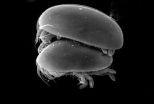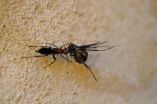Lights off? International experts call attention to dangers of exposure to light at night
World experts shed light on the extent of dangers of night-time artificial lighting, emphasizing that it is the short wavelength illumination - 'eco-friendly illumination' - that is causing most harm
2012-09-11
(Press-News.org) "The most important thing for us is to raise awareness of the dangers of artificial light at night and we have already come a long way now that the American Medical Association (AMA) recently announced its new policy recognizing adverse health effects of exposure to light at night and encouraging further research into the matter," said Prof. Abraham Haim, a leading authority on light pollution, who coordinated the 21st International Congress of Zoology (ICZ) that was held last week at the University of Haifa, Israel.
The panel of world experts discussed "Light Pollution and its Ecophysiological Consequences" and shed light on the extent of the dangers and harm that night-time artificial lighting causes, emphasizing that it is the short wavelength illumination that we have come to know as "eco-friendly illumination" that is causing the most harm (primarily LED lighting).
The participants were in full agreement that exposure to light at night affects circadian rhythms in nature – humans, animals and plants - which when thrown off can result in various illnesses and adverse symptoms. Prof. Haim presented one of his studies showing the adverse effects of exposure to light at night – particularly short wavelength blue LED - in the blind mole rat and in seeing rats, both of which showed varying levels of damage to their metabolic rates, hormone production, body mass, and oxygen consumption following exposure to LAN, as well as suppressed levels of melatonin production, which is responsible for tumor growth. "We expect to find similar results of damage from human exposure to LED lighting," Prof. Abraham concluded, and pointed out that "Western youngsters are typically surrounded by this sort of lighting in the confines of their own bedroom: from the smartphone, computer screen, and television."
"Street lights in populated areas are responsible for 60 percent of LAN pollution, which is intensified under cloudy conditions when the light is reflected back down to the ground," said Dr. Franz Hölker of the Leibniz Institute of Freshwater Ecology and Inland Fisheries, Germany, who chaired the panel with Noam Leader of the Israel Nature and Parks Authority. Others pointed out the excessive levels of light pollution found in industrial areas, greatly endangering surrounding wildlife.
###
Also participating in the panel were James Hale of the University of Birmingham, UK, and Dr. Rachel Ben-Shlomo and L. Ashkenazi of the University of Haifa. The participants, revealed the harm being done by LAN, to all types of plants and animals (mammals, birds, fishes, reptiles, amphibians, and invertebrates), putting many at risk of extinction.
For more details contact Rachel Feldman
rfeldman@univ.haifa.ac.il
+972-54-3933092
Communications and Media Relations
U
niversity of Haifa
ELSE PRESS RELEASES FROM THIS DATE:
2012-09-11
Researchers from North Carolina State University have developed a new method for forecasting seasonal hurricane activity that is 15 percent more accurate than previous techniques.
"This approach should give policymakers more reliable information than current state-of-the-art methods," says Dr. Nagiza Samatova, an associate professor of computer science at NC State and co-author of a paper describing the work. "This will hopefully give them more confidence in planning for the hurricane season."
Conventional models used to predict seasonal hurricane activity rely on classical ...
2012-09-11
The small ostracod Ankylocythere sinuosa measures no more than half a millimetre in length and lives on other crayfish. And, Spanish scientists have discovered it for the first time in Europe. The finding suggests that it arrived along with the invader crayfish Procambarus clarkii some 30 years ago but it is still unknown whether it can invade other crustacean species or whether it benefits or damages the expansion of the already established red swamp crayfish.
The red swamp crayfish (Procambarus clarkii) originates from the USA and Mexico and has been present in the Iberian ...
2012-09-11
Electronic Jewelry for Health
Bracelets and amulets are in the works at Dartmouth's Institute for Security, Technology, and Society (ISTS). Rather than items of mere adornment, the scientists and engineers are constructing personal mobile health (mHealth) devices—highly functional jewelry, as it were.
mHealth is a rapidly growing field where technology helps you or your physician monitor your health through mobile devices. This approach can offer more accurate and timely diagnoses as well as lower health costs. However, smartphones are often used to transmit collected ...
2012-09-11
University of Adelaide researchers say a small wasp that scientists had forgotten about for more than 200 years is now making a name for itself – as a predator of Australia's most common dangerous spider, the redback.
The wasp (Agenioideus nigricornis) was first described scientifically in 1775 by Danish entomologist Johan Christian Fabricius, thanks to samples collected in Australia during Captain Cook's first great voyage (1768).
"Since then, scientists have largely forgotten about the wasp," says Professor Andy Austin from the University of Adelaide's Australian ...
2012-09-11
Scientists at The University of Nottingham say adverse side-effects caused by the anti-parasitic drug quinine in the treatment of malaria could be controlled by what we eat.
The research, carried out by Nottingham scientists on the University's campuses in the UK and Malaysia, indicates that natural variation in our levels of the amino acid, tryptophan, has a marked bearing on how we respond to quinine treatment. It appears that the lower our levels of tryptophan the more likely it is that we would suffer side-effects. And because tryptophan is an essential amino acid ...
2012-09-11
VIDEO:
Research carried out at Universidad Carlos III in Madrid analyzes the search and visualization systems used by commercial stock photography agencies, whose estimated annual net sales reach over 150 billion...
Click here for more information.
Stock photography agencies, and not just those companies that dominate the digital photography market, are at the forefront of information search tools. "Their search, visualization and information downloading systems are extraordinarily ...
2012-09-11
Forgetfulness, lack of orientation, cognitive decline… about 700, 000 Germans suffer from Alzheimer's disease (AD). Now researchers from the University of Ulm, among them the Epidemiologist Professor Gabriele Nagel and the Neurologist Professor Christine von Arnim, have discovered that the serum-concentration of the antioxidants vitamin C and beta-carotene are significantly lower in patients with mild dementia than in control persons. It might thus be possible to influence the pathogenesis of AD by a person's diet or dietary antioxidants. 74 AD-patients and 158 healthy ...
2012-09-11
WASHINGTON -- Teens who play mature-rated, risk-glorifying video games may be more likely than those who don't to become reckless drivers who experience increases in automobile accidents, police stops and willingness to drink and drive, according to new research published by the American Psychological Association.
"Most parents would probably be disturbed to learn that we observed that this type of game play was more strongly associated with teen drivers being pulled over by the police than their parenting practices," said study lead author Jay G. Hull, PhD, of Dartmouth ...
2012-09-11
INDIANAPOLIS -- As outbreaks of preventable diseases such as whooping cough and measles increase in the United States, researchers from the Regenstrief Institute and Indiana University School of Medicine are investigating whether altruism, known to influence adults' decisions to immunize themselves, influences parental decisions to vaccinate their children.
"If enough people are immunized against a particular disease, it prevents outbreaks of that disease and protects the community. This is known as herd immunity, and it's a very important benefit of childhood immunization," ...
2012-09-11
WASHINGTON, D.C.—September 11, 2012—Today, The Dengue Vaccine Initiative (DVI) welcomed new clinical trial results that reveal progress in developing the first-ever dengue vaccine. In a publication in The Lancet, pharmaceutical company Sanofi Pasteur reported results from the first study conducted to evaluate the efficacy of any dengue vaccine candidate against clinical dengue disease in a population naturally exposed to dengue.
Dengue vaccine development efforts have been difficult because dengue is caused by four different related viruses, known as DENV 1, 2, 3 and ...
LAST 30 PRESS RELEASES:
[Press-News.org] Lights off? International experts call attention to dangers of exposure to light at night
World experts shed light on the extent of dangers of night-time artificial lighting, emphasizing that it is the short wavelength illumination - 'eco-friendly illumination' - that is causing most harm





